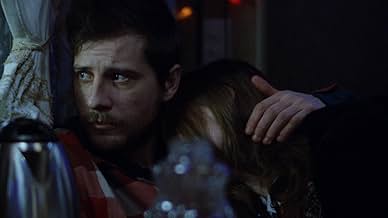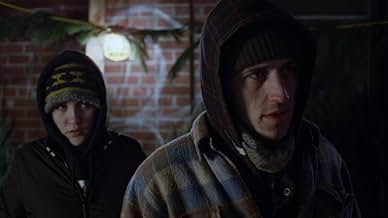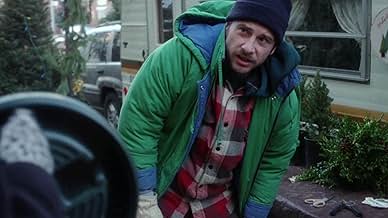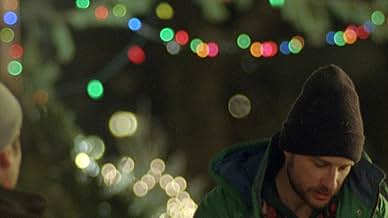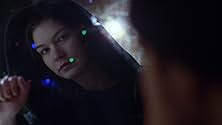IMDb RATING
6.6/10
1.3K
YOUR RATING
Heartbroken Christmas tree salesman moves to NYC, takes night job. Struggling emotionally until saving woman and interacting with eccentric customers turn his life around, saving him from se... Read allHeartbroken Christmas tree salesman moves to NYC, takes night job. Struggling emotionally until saving woman and interacting with eccentric customers turn his life around, saving him from self-destruction.Heartbroken Christmas tree salesman moves to NYC, takes night job. Struggling emotionally until saving woman and interacting with eccentric customers turn his life around, saving him from self-destruction.
- Awards
- 1 win & 6 nominations total
Dakota O'Hara
- Plain Wreath Customer
- (as Dakota Goldhor)
Featured reviews
The storytelling and direction seemed a bit clumsy, and somewhat amateurish. However, the main character was very believable, and I felt like I was seeing a real person, not an actor. But we never find out much at all about his background, or why or how he lost his former relationship. And the story never really develops much until late in the movie. We also never learn anything about Lydia's background, either, other than that she lives with some guy she isn't well-suited for.
What a lovely, heartfelt film. The reason it works so well is because, as always, not forcing any emotion is the way to go. It's devoid of any silly contrivances and everything because of that feels and sounds realistic. The lead actor is pretty great. I reckon this must have been a difficult role to cast because it's so reliant on silence, and the actor is able to infuse the film with charm and emotion without ever feeling like he is trying. It's probably one of the best Christmas films I have ever seen, and definitely deserves to be seen by a much larger audience. Definitely recommended for anyone who wants something real and very relevant.
I get the documentary-style indie concept. Focus a camera on scenarios that are so real that they border on reality t.v., but with actors playing roles. But if nothing is happening, the sociological slide show gets old quickly.
I love the idea of a day in the life of a Christmas tree salesman facing some kind of personal conflict. But there just wasn't enough happening here, nor much background information on the characters.
Indies seem fond of nicely framed shots of depressed people staring at a view or pondering something. They also seem fond of portraying life as depressing and pointless. It's almost as if that's an official point of view of the indie filmmaker community. Or maybe it's because they are of a certain generation and genuinely feel that way.
Having said that, depression does often go hand in hand with personal conflicts in a film, so I'll allow it.
The two main actors did a nice job of portraying real people with understated sadness and anomie. Unfortunately, like other reviewers have noted, the makers failed to develop potential plot lines to their potential. I kept checking the clock on netflix to see how much more time was left. That's not a good sign.
There is only one song, and that's at the end. So they didn't try to manipulate us with music. I suppose that is partly responsible for the documentary vibe.
Nice try. It has redeeming qualities,and something mildly interesting to say about the frailty of the human condition. But I was bored.
I love the idea of a day in the life of a Christmas tree salesman facing some kind of personal conflict. But there just wasn't enough happening here, nor much background information on the characters.
Indies seem fond of nicely framed shots of depressed people staring at a view or pondering something. They also seem fond of portraying life as depressing and pointless. It's almost as if that's an official point of view of the indie filmmaker community. Or maybe it's because they are of a certain generation and genuinely feel that way.
Having said that, depression does often go hand in hand with personal conflicts in a film, so I'll allow it.
The two main actors did a nice job of portraying real people with understated sadness and anomie. Unfortunately, like other reviewers have noted, the makers failed to develop potential plot lines to their potential. I kept checking the clock on netflix to see how much more time was left. That's not a good sign.
There is only one song, and that's at the end. So they didn't try to manipulate us with music. I suppose that is partly responsible for the documentary vibe.
Nice try. It has redeeming qualities,and something mildly interesting to say about the frailty of the human condition. But I was bored.
Just saying the title of Charles Poekel's directorial debut sparks a sadness inside a person, one that they've never experienced perhaps. Imagine getting to the point in life where you look upon a calendar, and due to poor circumstance, a failed relationship, a family death, or some other unforeseen situation, your mood for the holiday season is dour and sad and all you can do is simply sigh and say, yes, "Christmas, again."
Such is life for our lead character Noel, played by independent writer/director/actor Kentucker Audley, who has also worked with Joe Swanberg in the past, a Christmas tree salesman who is currently spending the holidays working through fond memories of a woman with whom he has just broken up. Now, Christmas is just an irritating force begging him to be happy and cheerful when he feels anything but. Through all this pain, Noel finds some sort of evident solace and comfort in schlepping Christmas trees to set up, deliver, cut down, or decorate, to the point where he seems to try and find every little thing wrong with his employees' actions because he would like to do what they're doing again.
Noel fights through the hurt, and is elevated by the people that come to his Christmas tree farm, the kind of quirky people that are just quirky enough to be believable, doing things like talking to their significant others on the phone whilst purchasing a tree, demanding that the salesman pose next to the tree for a picture to try and give an estimate on the height, and so forth. One day, Noel winds up finding Lydia (Hannah Gross) asleep on a park bench, missing her purse, a shoe, and clearly worn from a night of drunken escapades. She works to add some sporadic spice into his life upon leaving him rather abruptly the night after he finds her sleeping on a park bench. In the meantime, Noel slaves away at his job, working the tireless night shifts, guided and uplifted by the optimism brought upon him by lottery tickets and energy shots in order to maintain some semblance of sanity.
Noel is a fascinating character just by the way Poekel chooses to define and show him. In a screen writing sense, Poekel doesn't set up these compromising or very revealing scenarios that allow us to see Noel in a way that over-personalizes him or makes his motivations and emotions all too clear to us. Instead, Poekel prefers to have Christmas, Again function as a very meditative film, focused on intimate closeups of Noel's bearded face, wide eyes, and constantly overworked face. These traits alone personalize him more than most screen writing tactics could, and Poekel keeps Christmas, Again very observant in this manner. In seventy-seven minutes, rarely does a frame exist that Noel isn't in, so the result is a film that's focused on this sole subject to the point where his world becomes fairly clear, or at least extractable, without the need of overly obvious storytelling.
But, let's not forget, Noel wouldn't be the character he is without Kentucker Audley, an uncommonly natural performer with a gift at understated acting. Audley is a gifted performer thanks to his ability to take any character and, regardless of he or someone else is the writer, work with such a character to at least give him some kind of thesis or idea for with the audience can concern themselves. As stated, Audley's face says more than any writing Poekel could do, and his naturalism recalls the early days of mumblecore, where lowlit settings, naturalistic acting, and low budgets were as normal as believably eccentric, last-minute visitors to a Christmas tree farm.
Admittedly slight but a quietly observant look at functional loneliness and how sadness doesn't have to be a thoroughly exhausted theme in a film by way of orchestration and mawkish circumstance, Poekel's Christmas, Again hits all the right notes for a delightful anti-Christmas film. In a more cynical, but broader, dissection of the film, I find that the film looks at the lie of the season of Christmas; is it really the happiest time of the year, or a season that forces those lonely, unsatisfied, or hurting to look at themselves and only feel more of an outsider or a downer in the world. Personal empathy and just an understanding of human condition allows me to laud the film more on that level than any other one I can conceive, and that's a real accomplishment for a holiday film in and of itself.
Starring: Kentucker Audley and Hannah Gross. Directed by: Charles Poekel.
Such is life for our lead character Noel, played by independent writer/director/actor Kentucker Audley, who has also worked with Joe Swanberg in the past, a Christmas tree salesman who is currently spending the holidays working through fond memories of a woman with whom he has just broken up. Now, Christmas is just an irritating force begging him to be happy and cheerful when he feels anything but. Through all this pain, Noel finds some sort of evident solace and comfort in schlepping Christmas trees to set up, deliver, cut down, or decorate, to the point where he seems to try and find every little thing wrong with his employees' actions because he would like to do what they're doing again.
Noel fights through the hurt, and is elevated by the people that come to his Christmas tree farm, the kind of quirky people that are just quirky enough to be believable, doing things like talking to their significant others on the phone whilst purchasing a tree, demanding that the salesman pose next to the tree for a picture to try and give an estimate on the height, and so forth. One day, Noel winds up finding Lydia (Hannah Gross) asleep on a park bench, missing her purse, a shoe, and clearly worn from a night of drunken escapades. She works to add some sporadic spice into his life upon leaving him rather abruptly the night after he finds her sleeping on a park bench. In the meantime, Noel slaves away at his job, working the tireless night shifts, guided and uplifted by the optimism brought upon him by lottery tickets and energy shots in order to maintain some semblance of sanity.
Noel is a fascinating character just by the way Poekel chooses to define and show him. In a screen writing sense, Poekel doesn't set up these compromising or very revealing scenarios that allow us to see Noel in a way that over-personalizes him or makes his motivations and emotions all too clear to us. Instead, Poekel prefers to have Christmas, Again function as a very meditative film, focused on intimate closeups of Noel's bearded face, wide eyes, and constantly overworked face. These traits alone personalize him more than most screen writing tactics could, and Poekel keeps Christmas, Again very observant in this manner. In seventy-seven minutes, rarely does a frame exist that Noel isn't in, so the result is a film that's focused on this sole subject to the point where his world becomes fairly clear, or at least extractable, without the need of overly obvious storytelling.
But, let's not forget, Noel wouldn't be the character he is without Kentucker Audley, an uncommonly natural performer with a gift at understated acting. Audley is a gifted performer thanks to his ability to take any character and, regardless of he or someone else is the writer, work with such a character to at least give him some kind of thesis or idea for with the audience can concern themselves. As stated, Audley's face says more than any writing Poekel could do, and his naturalism recalls the early days of mumblecore, where lowlit settings, naturalistic acting, and low budgets were as normal as believably eccentric, last-minute visitors to a Christmas tree farm.
Admittedly slight but a quietly observant look at functional loneliness and how sadness doesn't have to be a thoroughly exhausted theme in a film by way of orchestration and mawkish circumstance, Poekel's Christmas, Again hits all the right notes for a delightful anti-Christmas film. In a more cynical, but broader, dissection of the film, I find that the film looks at the lie of the season of Christmas; is it really the happiest time of the year, or a season that forces those lonely, unsatisfied, or hurting to look at themselves and only feel more of an outsider or a downer in the world. Personal empathy and just an understanding of human condition allows me to laud the film more on that level than any other one I can conceive, and that's a real accomplishment for a holiday film in and of itself.
Starring: Kentucker Audley and Hannah Gross. Directed by: Charles Poekel.
10skoepfer
Rarely a film come along that captures the grit and nuance of a city's unique personality. "Christmas, Again" presents a touching drama that extends beyond the mainstream glitz and holiday glamor most associate with New York City during the most busy and commercial of holidays. Like its spiritual predecessors "Chop Shop" & "Man, Push, Cart," "Christmas, Again" peeks into one of New York's largely unknown indigenous communities in a near documentary fashion to tell an intimate story of love that viewers will embrace; regardless of their city or origin. There are plenty of films which cheaply capitalize on the Big Apple's Christmas draw; the same draw that brings tourists to the city by the thousands. But, few tourists venture away from Times Square or Rockefeller Center to truly get to know the depth of New York City. Similarly, I encourage viewers to venture into "Christmas, Again" and enjoy an intimate view of Christmas in New York not often seen.
Did you know
- TriviaThe film is astonishingly similar in plot and settings to All Is Bright (2013). Both plots involve down on their luck men attempting to earn money by selling freshly cut trees for the Christmas holiday. Moreover, both stories take place in New York.
- SoundtracksThe Swan
Written by Camille Saint-Saëns
Performed by Clara Rockmore & Nadia Reisenberg
(c) 1977 Delos Music
Details
- Release date
- Country of origin
- Official site
- Language
- Also known as
- Різдво, знову
- Filming locations
- See more company credits at IMDbPro
Box office
- Gross worldwide
- $17,341
- Runtime
- 1h 20m(80 min)
- Color
- Aspect ratio
- 1.78 : 1
Contribute to this page
Suggest an edit or add missing content



